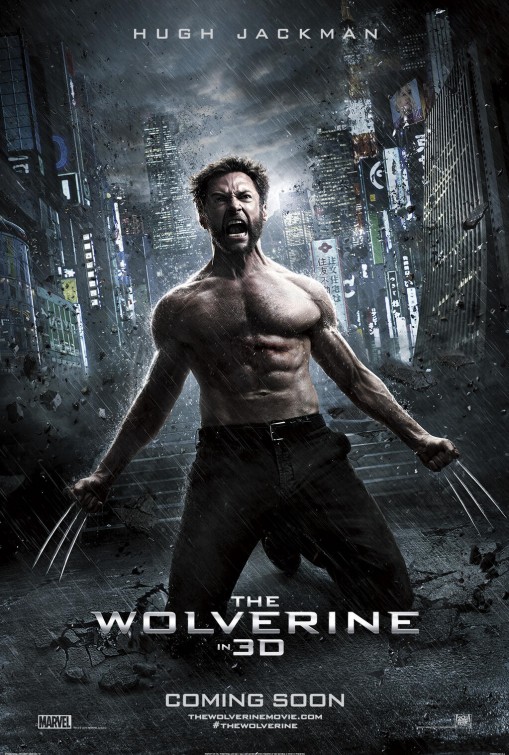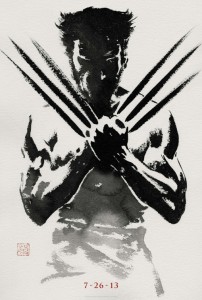 Through trailers or TV spots you’ve likely spotted the image of Wolverine in the snow, dozens of roped arrows sticking out of his back as Ninjas try to restrain him, and it’s a fitting image to represent The Wolverine. The moment you start breaking down all of the things that happen in this film, it becomes clear that it’s as based on plot contrivances as any of the modern breed of blockbusters with particularly duct-taped-together plotlines, and tensions based on situations that won’t matter one scene later. Each of these contrivances are like a single arrow plunged into Hugh Jackman’s back, with his Wolverine struggling forward against the pull of all those taught ropes.
Through trailers or TV spots you’ve likely spotted the image of Wolverine in the snow, dozens of roped arrows sticking out of his back as Ninjas try to restrain him, and it’s a fitting image to represent The Wolverine. The moment you start breaking down all of the things that happen in this film, it becomes clear that it’s as based on plot contrivances as any of the modern breed of blockbusters with particularly duct-taped-together plotlines, and tensions based on situations that won’t matter one scene later. Each of these contrivances are like a single arrow plunged into Hugh Jackman’s back, with his Wolverine struggling forward against the pull of all those taught ropes.
The good news is all of that struggling and straining is great for our hero! The Wolverine turns out to be a real blast that, for the vast majority of its running time, is an incredibly effective action movie with the best Wolverine material any X-film has yet included.
Naturally the black cloud that hovers over this production is the abysmal, shockingly awful X-Men Origins film that preceded it. Almost right away fears of a similar assault to good taste and sense are dispelled as it becomes clear that director James Mangold has things under control. A prologue in a Japanese POW camp plays out beautifully. We meet a soldier amidst evacuation chaos as he releases prisoners and some particularly ominous B-29’s approach the adjacent city. There’s real grace to how Wolverine is introduced, how his connection with this soldier is forged, and how little details like bone-claws are introduced with no unnecessary fanfare. It’s a 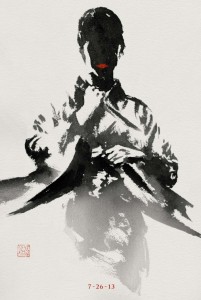 great vignette that alludes to the complex dynamic Wolverine has with, well, any other living being: he is a dangerous animal to be caged, but in the right moment he is the purest kind of hero. Wolverine’s powers are reiterated and dramatically illustrated here as well, and then we’re off to the present day, where Logan is living in self-exile on the side of a mountain.
great vignette that alludes to the complex dynamic Wolverine has with, well, any other living being: he is a dangerous animal to be caged, but in the right moment he is the purest kind of hero. Wolverine’s powers are reiterated and dramatically illustrated here as well, and then we’re off to the present day, where Logan is living in self-exile on the side of a mountain.
The Wolverine is nicely calibrated in how it directly ties itself into the main X-Men franchise (Origins is effectively, blessedly ignored). Logan is plagued by visions of Jean Grey, and his guilt over her death is overwhelming enough to trigger his deepest instincts of isolation. In a coincidence that surely isn’t, Logan’s visions of Grey happen to strongly recall Joe Carnahan’s The Grey. These scenes are meaty though- Logan shares entire conversations with this vision of his departed love, though Logan’s own self-loathing and guilt seep into her and add an aggressive, accusatory sheen to her words.
Obviously the story ramps up once Yukio, a martial-arts proficient mutant with the pyschic ability to see how people will die, tracks down Logan and convinces him to visit the deathbed of the head of Japan’s largest conglomerate, occupied by the man Logan once saved in a POW camp. From there ninjas start to happen and the film begins weaving in lots of semi-political exposition, with Wolverine ultimately ending up in a giant chase scenario as he attempts to protect the beautiful Mariko, granddaughter of the soldier and heir to his tech empire.
It’s at this point the movie’s Scooby-Doo screenwriting kicks in and the film starts keeping secrets, introducing characters with hidden motivations and planting seeds for the reveal of a great big conspiracy. All of this works to give the Wolverine something to be suspicious of and to make people chase, capture, and fight other people, but none of it will pay off in any interesting 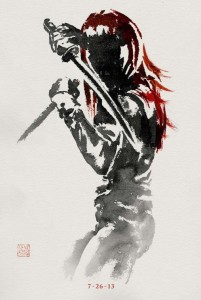 way. Mark Bomback and Scott Frank’s screenplay (with uncredited work from Chistopher McQuarrie) consistently waves pulpy intrigue into the script, as if building a web on which our hero can run to his destination. Fortunately, by the time that web collapses and everything is revealed in a dumb twist yanked right out of a Sunday morning cartoon, Logan has already reached his destination, and so have we.
way. Mark Bomback and Scott Frank’s screenplay (with uncredited work from Chistopher McQuarrie) consistently waves pulpy intrigue into the script, as if building a web on which our hero can run to his destination. Fortunately, by the time that web collapses and everything is revealed in a dumb twist yanked right out of a Sunday morning cartoon, Logan has already reached his destination, and so have we.
What The Wolverine gets right is that it is about Wolverine. The film is almost entirely from his perspective, and the big twist here is that for a good portion of the film he is stricken of his healing powers. Though not fully mortal, this creates a new dynamic as each bullet-wound and punch actually means something for the hero. Mangold does a great job of introducing pain and weakness into Logan’s world, and his action sequences are markedly improved by the fact that Wolverine is struggling to be as badass as usual. Hugh Jackman has a good handle on playing pain, so the shocking novelty of a wound that won’t heal registers beautifully on Logan’s face, even as he plows through with his usual sarcasm and “leave me alone, I’m fine” posturing. What this achieves is creating a scenario where every action scene actually means something for the character, and makes what might have been routine action scenes more interesting. In terms of pure filmmaking, the action scenes are never particularly inventive, but Mangold has a firm grasp on building tension and maintaining coherence, so each one of them is more than effective and exciting enough. Even better this gives Jackman new facets of a familiar character to explore- we get a wide-range of Wolverine’s in this picture, and Jackman effortlessly nails each of them, be it gruff Wolverine, sad Wolverine, funny Wolverine, lusty Wolverine, or super-pissed-off-rage-monster Wolverine. They’re all great.
Logan is also given a love story here, and it is shockingly effective. Though the film grinds to a twenty minute halt in the middle to pay it off, Logan shares a sequence of great scenes with Tao Okamoto as the two learn about each other and relate to their respective isolations. There is  hope for Logan here, and I was surprised how pleased I was to see this character (who hasn’t been in a good movie in a decade) find some small happiness. Even better, this is surely one of the only tentpole films this summer to pass the Bechdel Test, and the very different relationships Logan shares with Yukio and Mariko recall his very different interests in Jean and Rogue. It’s refreshing to see a comic book hero with time in his schedule to care about a woman he’s not going to fuck at some point.
hope for Logan here, and I was surprised how pleased I was to see this character (who hasn’t been in a good movie in a decade) find some small happiness. Even better, this is surely one of the only tentpole films this summer to pass the Bechdel Test, and the very different relationships Logan shares with Yukio and Mariko recall his very different interests in Jean and Rogue. It’s refreshing to see a comic book hero with time in his schedule to care about a woman he’s not going to fuck at some point.
There comes a point at the film’s climax where the film has to start owning up to its own plotlines and setups, and so begins a ten minute knot of eye-rolling revelations and general dumbness. This is where that aforementioned web breaks, but we’re already all the way through the movie, we care about Logan more than we ever have, and we’re only a few minutes from walking out of the door (though don’t dart off too fast- there’s a great post-credits sequence). It’s a win by default, though there a few moments and lines that feel like they’re from the more direct sequel to X-Men Origins.
The point that is ultimately proved in The Wolverine is that Hugh Jackman’s Wolverine is still a potent, valuable presence in the cinematic superhero world, and that when you explore the unique challenges of his circumstances and don’t surround him with distractingly ridiculous bullshit, everyone is going to have a good time. (Especially when the filmmakers have the courtesy to pack all of the shittiness into a compact, easily ignored ten minute stretch.)
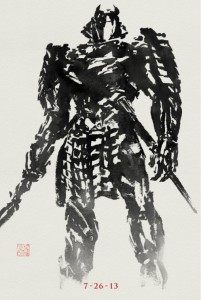 James Mangold and co. have contributed one of the better entries to the X-Men franchise, and one of the better blockbusters released this year. In fact, if you prioritize potent character work over grand spectacle, you may agree that this is the best superhero film of the summer. I certainly enjoyed it with fewer reservations than I did the the Men, both Super and Iron, even if the bigger ambitions of those films leave them looming larger in my mind. In terms of paying off our collective investment in a character, setting him up for new challenges and providing him with a clear, exciting adventure though, The Wolverine reminds us where the bar ought to be.
James Mangold and co. have contributed one of the better entries to the X-Men franchise, and one of the better blockbusters released this year. In fact, if you prioritize potent character work over grand spectacle, you may agree that this is the best superhero film of the summer. I certainly enjoyed it with fewer reservations than I did the the Men, both Super and Iron, even if the bigger ambitions of those films leave them looming larger in my mind. In terms of paying off our collective investment in a character, setting him up for new challenges and providing him with a clear, exciting adventure though, The Wolverine reminds us where the bar ought to be.
Rating: 




Out of a Possible 5 Stars
